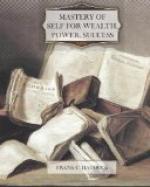“Everyone can testify that the psychical state called fear consists of mental representations of certain painful results” (James). The mental representations may be very faint as such, but the idea of hurt to self is surely present. If, then, it can be profoundly believed that the real self cannot be hurt; if the reason can be brought to consider vividly and believingly all quieting considerations; if the self can be held consciously in the assurance that the White Life surrounds the true self, and is surely within that self, and will suffer “no evil to come nigh,” while all the instincts of self—preservation may be perfectly active, fear itself must be removed “as far as the east is from the west.”
This splendid conviction I earnestly commend to all readers.
These are the ways, then, in which any occasion for fear may be divided:
As a warning and as a maker of panic. But let us say that the warning should be understood as given to reason, that fear need not appear at all, and that the panic is perfectly useless pain. With these discriminations in mind, we may now go on to a
PRELIMINARY STUDY OF FEAR.
Fear is (a) an impulse, (b) a habit, (c) a disease.
Fear, as it exists in man, is a make-believe of sanity, a creature of the imagination, a state of insanity.
Furthermore, fear is, now of the nerves, now of the mind, now of the moral consciousness.
The division depends upon the point of view. What is commonly called normal fear should give place to reason, using the word to cover instinct as well as thought. From the correct point of view all fear is an evil so long as entertained.
Whatever its manifestations, wherever its apparent location, fear is a psychic state, of course, reacting upon the individual in several ways: as, in the nerves, in mental moods, in a single impulse, in a chronic habit, in a totally unbalanced condition. The reaction has always a good intention, meaning, in each case, “Take care! Danger!” You will see that this is so if you will look for a moment at three comprehensive kinds of fear—fear of self, fear for self, fear for others. Fear of self is indirectly fear for self—danger. Fear for others signifies foresensed or forepictured distress to self because of anticipated misfortune to others. I often wonder whether, when we fear for others, it is distress to self or hurt to them that is most emphatically in our thought.
Fear, then, is usually regarded as the soul’s danger signal. But the true signal is instinctive and thoughtful reason.
Even instinct and reason, acting as warning, may perform their duty abnormally, or assume abnormal proportions. And then we have the feeling of fear. The normal warning is induced by actual danger apprehended by mind in a state of balance and self-control. Normal mind is always capable of such warning. There are but two ways in which so-called normal fear, acting in the guise of reason, may be annihilated: by the substitution of reason for fear, and by the assurance of the white life.




